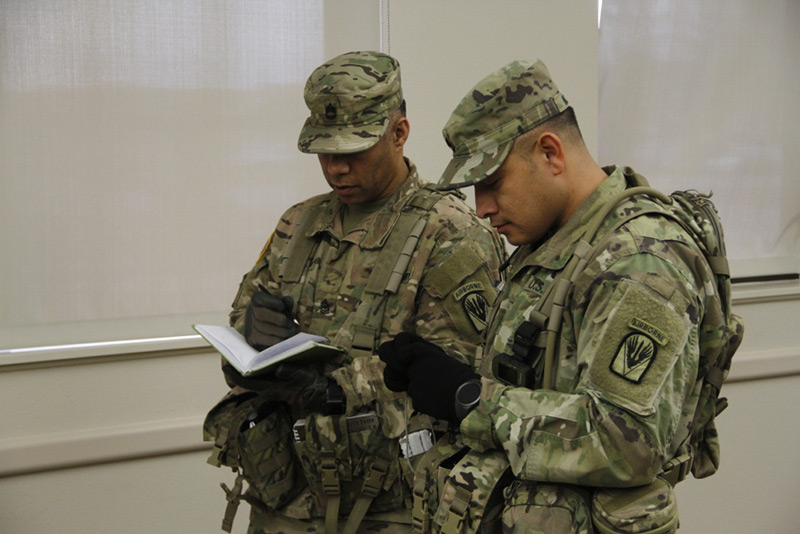Strengthen Resilience
Negative physical, emotional, and behavioral responses are natural and automatic responses to being subjected or exposed to counterproductive leadership. Refer to the following techniques for maintaining your overall well-being during these challenging circumstances as well as techniques to protect your contribution to the mission.
Maintain Your Overall Well-Being

Being a recipient of counterproductive leadership can increase tension, anxiety, stress, exhaustion, and vulnerability to illness. It can decrease concentration and lead to feelings of shame, helplessness, insecurity, and resignation. People who witness these behaviors can also experience negative emotions like this. Therefore, it’s important to maintain your emotional, mental, physical, and spiritual well-being.
Recognize and regulate your emotions
Situations where you’re subjected to counterproductive leadership and feel threatened can trigger your body’s natural “fight or flight” response. When faced with danger or a threat, the body responds by physically preparing the body to either fight off the attack or flee by increasing your heart rate, breathing, adrenaline levels, etc. However, this hard-wired reaction can interfere with your ability to respond to situations rationally and logically. Our “fight” tendencies make us respond in these situations by seeking to protect ourselves. While protecting ourselves may be appropriate, doing so when emotions are high isn’t likely to result in a productive outcome. When you feel your emotions getting in the way of your ability to think logically and rationally:
- Give yourself space, either physically or mentally.
- Take deep breaths to slow down your body’s automatic response to anger and to decrease your heart rate.
- Lower your shoulders away from your ears and try to relax your body.
- Speak at a normal pitch and pace, demonstrating that you’re in control of yourself.
- Fight the urge to show your emotions physically via facial expressions, squirming in your chair, or other indications that you’re upset.
Re-engage your support systems
Stressful times may leave you tired and feeling like withdrawing, but it’s even more critical to engage with others to help you cope.
- Lean on your support system. Everyone’s support system is different and unique to them; it may include others in your workplace (like peers) or individuals outside of it, like a trusted confidante, mentor, friends, or close family members. Forming strong bonds with your peers can help you all better tolerate and address the situation. Your support system can help you express your emotions and process your experiences, provide perspective, discuss options for addressing the situation, and help you “check” your thinking and assumptions.
- Connect with others. If you feel your current support system needs some strengthening, then reach out to others who you may have lost touch with. Get involved in professional, social, or hobby organizations, or volunteer in your community to build connections with people you can later learn to trust and lean on.
- Talk to a chaplain. Chaplains can provide advice and guidance on how to manage difficult work situations and how to compartmentalize your work and home life.
Rejuvenate
Find ways to rejuvenate such as:
- Exercise. Physical activity and exercise are effective ways to relieve stress. This helps relax your mind and increases your body’s endorphins, which are our “feel-good” neurotransmitters. Simply taking a walk during a stressful period can help you feel calmer, more alert, and more positive. Having a consistent exercise routine is also useful for helping to stave off the physical and mental consequences of stress.
- Practice yoga, meditation, or mindfulness. Relaxation techniques like yoga, meditation, and mindfulness can have physical as well as mental benefits. Along with the physical benefits of strength and flexibility, these techniques help relieve stress, calm and declutter your mind, and help you become more focused.
- Get enough sleep. The life of a Soldier and Army civilian makes it difficult to get enough sleep. However, sleep is essential for achieving your best self – physically, mentally, and emotionally. Sleep allows our bodies and brains to recharge and recover. Stressful situations can also disrupt sleep patterns or cause insomnia, making it difficult to get a good night’s sleep. Not getting enough sleep can affect your memory, judgment, mood, weight, emotions, concentration, and many more bodily functions. Getting optimal sleep starts with learning and practicing good sleep habits.
Regain your confidence
Experiencing counterproductive leadership can lead you to question your abilities and feel less competent or insecure. To restore your confidence:
- Use positive affirmations. Use affirmations, or positive self-talk, to build positive mental habits. After all, we are what we think. Examples of affirmations include “I am strong and will make it through this situation” and “I am competent and good at my job.”
- Review past accomplishments. Reflect on your accomplishments to boost your self-confidence. Review positive performance feedback you’ve received from others, educational accomplishments, career successes, and times you overcame challenging situations. Remain confident in the fact that you’re where you are in your career because you have the experience, education, and training to successfully complete your responsibilities. Leaders who use counterproductive leadership may actively try to convince you of the opposite; don’t let them have that victory.
- Continue to learn and grow. Continue to learn and grow as a leader in your field to help build your confidence and competence. Take classes, read articles and books, and talk with experienced leaders to increase your knowledge and feelings of competence.
Reframe the situation
Although difficult, work on reframing the situation in your mind and making it a learning experience.
- Reflect internally and/or with others in your social support system. You’re experiencing an extremely stressful and difficult situation. Try to use the situation as an opportunity to learn about yourself, others, and your organization.
- Recognize that you aren't responsible for everything that happens in life. Counterproductive leadership is triggered by factors that are often beyond your control. Consistently remind yourself to not take it personally, that the counterproductive leadership behaviors are likely more about the leader and the challenges he or she is facing than about you.
- Practice emotionally detaching from the situation. Try to understand the leader’s perspective and actions from a logical standpoint, not an emotional one. Avoid ruminating or continuously dwelling on the situation; this can lead to depression and burnout. If you find yourself falling into this pattern, set a time limit for how long you can think about the situation before letting it go, distract yourself with other tasks, or use the other techniques in this section to help you move forward.
Protect Your Contribution to the Mission

In addition to enhancing your overall well-being, remember that you’re a professional who seeks to do your best and uphold the Army values. Therefore, it’s important that you consider how to ensure you can best contribute to the mission regardless of the counterproductive leadership you’re experiencing or witnessing.
Do your duty
Doing your duty means continuing to put forth your best effort, even in challenging circumstances. Come to meetings prepared. Anticipate what you might be asked and have quick, direct answers that will satisfy your leader. Speak confidently and logically.
Document your work and exchanges
Document all exchanges between you and the leader by saving emails, taking meeting notes or noting orders, and/or having a witness present (e.g., a peer or mentor). Document your work by keeping daily logs of your work efforts. If you’re directed to change direction, clarify expectations (in writing) and obtain written directions from the leader or others involved when possible.
Consider confidentiality
Be cautious about what you share and how and when you do so. For instance, consider when you want to put something in writing versus when you might not want to do so. Don’t assume that others, particularly the leader in question, will maintain your confidentiality. Assume that information will be disclosed and decide what you should reveal accordingly. Recognize that this technique doesn’t mean you should “hoard” information or intentionally withhold it from those who need it. Withholding information, especially if done improperly or with ill-intentions, could erode morale and decrease productivity. Instead, it means you should be intentional with how you share sensitive information.
Be honorable in your conduct
You want to maintain your reputation as a principled, ethical, and “above bar” Soldier. Therefore, don’t share gossip, rumors, or questionable judgment. Take time to consider the credibility of the source of information before you share or disseminate it with others. The “rumor mill” is often damaging to unit climates and can quickly get out of hand. Whether it’s the counterproductive behavior of a leader, an adverse action occurring in the unit, or speculation about changes to the mission, resist any temptation to engage in behavior that undermines your honorable conduct.
Consider requests from the leader before agreeing
In some cases, the leader may make a request of you that you’re not sure is in the best interest of you, your unit, and the Army. While you must follow direct orders that do not violate a regulation, there may be other situations where you have more discretion on whether to comply or not. For instance, a leader could ask you to do something that is outside the scope of your duties and that benefits the leader without necessarily benefitting the unit’s mission. Document your decision to accept or deny the request in writing.